The mythic element cannot be eliminated out of history. Men who play leading parts on the world’s stage gather about them the admiration of friends and the animosity of disappointed rivals or political enemies. The atmosphere becomes charged with legends of what they have said or done—some inventions, some distortions of facts, but rarely or never accurate. Their outward acts, being public, cannot be absolutely misstated; their motives, being known only to themselves, are an open field for imagination; and as the disposition is to believe evil rather than good, the portraits drawn may vary indefinitely, according to the sympathies of the describer, but are seldom too favourable. The more distinguished a man is the more he is talked about. Stories are current about him in his own lifetime, guaranteed apparently by the highest authorities; related, insisted upon; time, place, and circumstance accurately given—most of them mere malicious lies; yet, if written down, to reappear in memoirs a hundred years hence, they are likely to pass for authentic, or at least probable. Even where there is no malice, imagination will still be active. People believe or disbelieve, repeat or suppress, according to their own inclinations; and death, which ends the feuds of unimportant persons, lets loose the tongues over the characters of the great. Kings are especially sufferers; when alive they hear only flattery; when they are gone men revenge themselves by drawing hideous portraits of them, and the more distinguished they may have been the more minutely their weaknesses are dwelt upon. “C’est un plaisir indicible,” says Voltaire, “de donner des décrets contre des souverains morts quand on ne peut en lancer contre eux de leur vivant de peur de perdre ses oreilles.” The dead sovereigns go their way. Their real work for good or evil lives after them; but they themselves are where the opinions expressed about their character affect them no more. To Cæsar or Napoleon it matters nothing what judgment the world passes upon their conduct. It is of more importance for the ethical value of history that acts which as they are related appear wicked should be duly condemned, that acts which are represented as having advanced the welfare of mankind should be duly honoured, than that the real character of individuals should be correctly appreciated. To appreciate any single man with complete accuracy is impossible. To appreciate him even proximately is extremely difficult. Rulers of kingdoms may have public reasons for what they do, which at the time may be understood or allowed for. Times change, and new interests rise. The circumstances no longer exist which would explain their conduct. The student looks therefore for an explanation in elements which he thinks he understands—in pride, ambition, fear, avarice, jealousy, or sensuality; and, settling the question thus to his own satisfaction, resents or ridicules attempts to look for other motives. So long as his moral judgment is generally correct, he inflicts no injury, and he suffers none. Cruelty and lust are proper objects of abhorrence; he learns to detest them in studying the Tiberius of Tacitus, though the character described by the great Roman historian may have been a mere creation of the hatred of the old Roman aristocracy. The manifesto of the Prince of Orange was a libel against Philip the Second; but the Philip of Protestant tradition is an embodiment of the persecuting spirit of Catholic Europe which it would be now useless to disturb. The tendency of history is to fall into wholesome moral lines whether they be accurate or not, and to interfere with harmless illusions may cause greater errors than it aspires to cure. Crowned offenders are arraigned at the tribunal of history for the crimes which they are alleged to have committed. It may be sometimes shown that the crimes were not crimes at all, that the sufferers had deserved their fate, that the severities were useful and essential for some great and valuable purpose. But the reader sees in the apology for acts which he had regarded as tyrannical a defence of tyranny itself. Preoccupied with the received interpretation, he finds deeds excused which he had learnt to execrate; and in learning something which, even if true, is of no real moment to him, he suffers in the maiming of his perceptions of the difference between right and wrong. The whitewashing of the villains of tradition is, therefore, justly regarded as waste of labour. If successful, it is of imperfect value; if unsuccessful, it is a misuse of industry which deserves to be censured. Time is too precious to be squandered over paradoxes. The dead are gone; the censure of mankind has written their epitaphs, and so they may be left. Their true award will be decided elsewhere...
